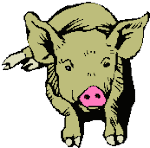By chance, we ran across this report, in English, on the farm on Bornholm, that seems to be the centre of Danish Crown's new Bornholm antibiotic-free pig and pork experiment.
It dates back to July 2013: before the Bornholm Experiment was established, but very much after the very similar Islay High Health Pig Farm was first proposed by the writer.
As you can see, there was once a strong connection between Britain and this particular farm.
Obviously both islands, Danish and Scottish, will be picking up on the situation.
As before, we suggest everyone reads what the writer actually proposed, rather than the storm of abuse, stalking and disinformation, designed to exclude Islay and Scotland from an important scientific experiment and the high status employment involved.
The potential human health benefits alone are massive.
Whilst Islay and Edinburgh, Bornholm and Copenhagen ponder the situation, there are many islands lying far enough from pig production, and up prevailing wind, that could offer a suitable site. That would include many off Ireland, Wales, England, and indeed even the Channel Islands.
If Islay wants the investment and the jobs, they may now need to move very quickly. Competition will be biting at their heels.
The original feature published in "Agriculture and Food" is here. Be sure to read in full.
July 2013
Special Feature: Bornholm pigs
Pig Industry Matters went on a fact-finding tour of the island of Bornholm to discover more about the Bornholm pig or 'Bornholmergris'.
It's known as the Sunshine Island and the pigs that are bred on the Danish island of Bornholm, in the middle of the Baltic Sea, would probably agree with this description - at least the pigs that are bred by Kristina and Hans Peter Sonne.
Situated in Rønne, the largest town on the island, the farm, which used to be UK Contract approved, supplies five local finishing farms with 30 kg Bornholm pigs that are subsequently sold to Danish Crown...
